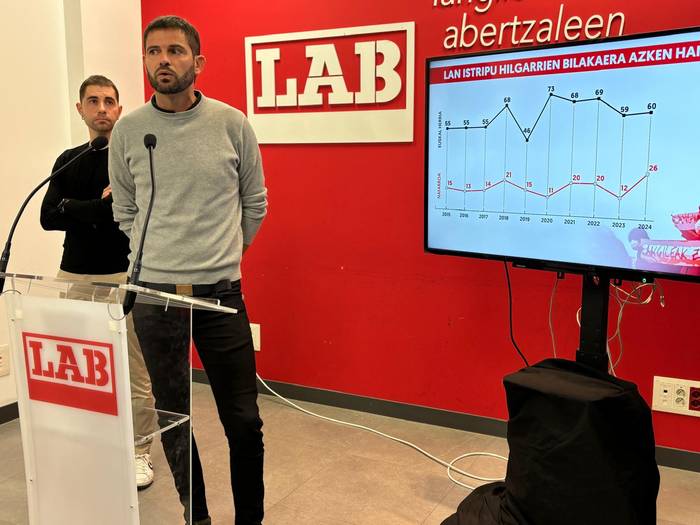Why was that feminist struggle?
- It started in March 2016. The fighting would have lasted for almost two years, until the 378 days of strike. The workers in the residences of Bizkaia were in full swing. Almost all workers were women, managers who perform care tasks, in precarious working conditions. No surprises, like care always taken by women, no counterpart or bad pay. Signing the fifth convention was a victory, but that struggle achieved much more than improving working conditions: women were empowered, put care at the center, managed to sensitize society and is being an example and a milestone for other precarious feminized sectors. In collaboration with the Manu Robles-Arangiz and ARGIA Institute of the ELA trade union, we have published the book Berdea da more berria, in which we have counted the keys to the strikers’ struggle.
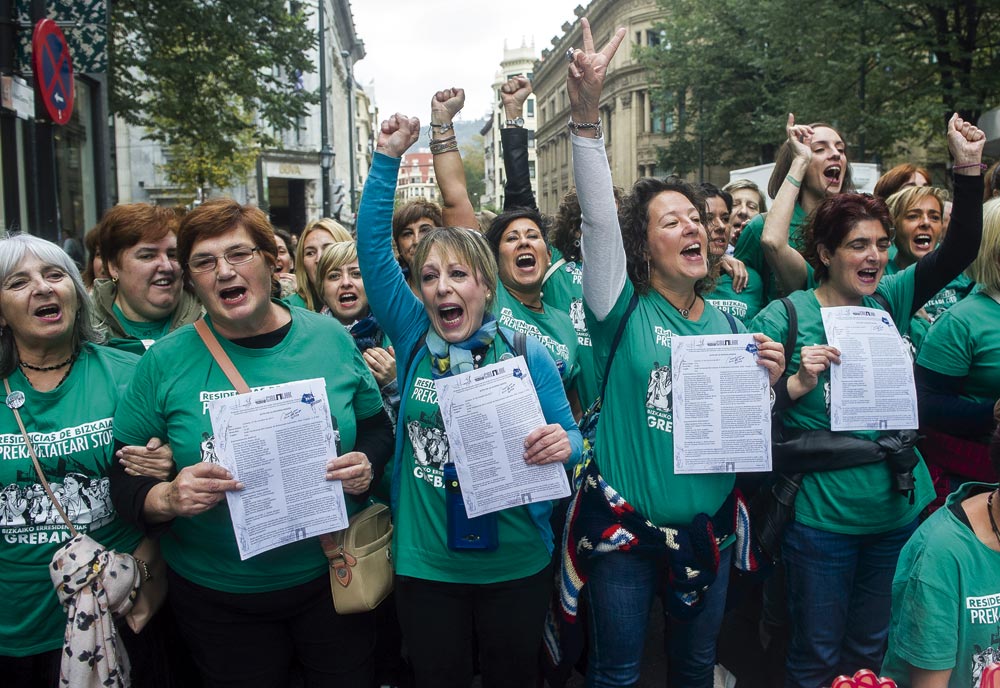
Liburuko protagonistak emakume grebalariak dira. Zortzi borrokalari elkarrizketatu ditugu: Maribel Sampedro Martínez, Ainhoa Menéndez Llamosas, Marina Costa Bonome, Verónica Aguado Otero, Lara Góngora Góngora, Marisol Rueda Espinha eta Aitziber Tolosa Contreras. Haien ahotik kontatzen da 2016ko greba handia. Halako indar erakustaldia ez da, ordea, hutsetik sortu. Liburuaren lehen zatian, 1980ko urteetara egin dugu atzera. ELA sindikatuak sektorean egindako apustuaren giltzarriak azaldu ditugu eta egoitzetako emakume zaintzaileen hazte prozesua kontatu.
Egilea: Onintza Irureta Azkune.
Hitzaurrea: Irantzu Varela Urrestizala.
Argia liburuak, 2019, 144 orrialde
Liburu aurkezpenak
Otsailak 20, Bilbo · 19:00 Bira Kultur Gunea
Martxoak 7, Baiona · 20:00 Manu Robles-Arangiz Fundazioaren egoitzan
LIBURUA SALGAI ARGIAREN AZOKAN
The employers in the sector were caught up in goosebumps when they heard the improvements that the ELA trade union representatives demanded for the fifth convention. However, they signed: EUR 140 per year of salary increase; 106 hours less work up to 1,592 hours per year; 20 minutes of rest; 100% of casualties; increase in Sundays and nights. Employers were not accustomed to women demanding and achieving working conditions comparable to those of men.
It was a slowly fired victory, and beyond working conditions, the strike brought to the front line many of the achievements and strengths that the union had worked for years. To fall short would be to say that that struggle was a labor conflict. The feeling of many striker women has been that the long strike has had many branches. To begin with, dozens of women managed to form a powerful network in the sector that ELA began to structure in Bizkaia before 2016. In the spring of 2016, workers who were in difficulties in feminism and labor conflicts met, with little experience and much fear of protest. They managed to channel strong individual and collective empowerment processes. Unlike the decades of history in the sector, a group of union representatives gained absolute prominence, almost all of them women. The negotiating tables were chaired by women, in front of an almost exclusively male employer. Women often became angry when they were accused of being a puppet of the union.
They learned to organize among themselves and had a clearer goal than ever before: they witnessed the bosses' machist mentality at the negotiating tables and understood and suffered the consequences of the privatization policy that public institutions had been carrying out for some time.
In the media and on the street, an exhibition of strength was held, especially in Bizkaia. The issue was very fragile, in a long-term strike vulnerable people, old and with psychiatric problems, would be left without proper vigilance. During the arrests that have been carried out for many years, it was common to hear that they were 'cruel' and 'criminal': the workers were accused of abandoning the elderly. However, in the last strike they managed to turn the tortilla around. Through socialization and awareness-raising campaigns, they managed to introduce the message into society: residents are not well served if workers do not have decent working conditions. It was time to value care. The workers directly related their work situation to the residents' quality of life. Strikers often denounced the need to force people to treat them as machines. A trade union representative told the director: "The old ones are like croquettes, we put them in egg flour: a, a, a, next! ". For the first time in the history of the sector, residents’ relatives created the partnership to support strikers.
Will the 2016 strike be a sign of what it will be?
Union representatives who were part of the front line have referred to ELA’s support. Human resources, sound legal structure, experience and resilience fund. The strike was long, among other things, because it was a feminized sector, which was the struggle of women. More and more conflicts have a female face. If employers are not taken seriously, conflicts can be hard and hard. How can you sustain, and above all, how can you win this kind of sum if there is no strong union structure?
The workers' strike has also been called for a feminist strike. How will it affect ALS, the union that has led the conflict, this kind of struggle from now on? Trade unionism has had and continues to be a male model. In this fight you can see the steps to follow to crack this model. After this strike, the union has called itself a feminist class union. In many of the conflicts that are being managed lately, women are fighting, and in ALS there are more and more women aiming. 45% of participants are already women. But beyond ALS, how is it going to affect this feminist struggle that has lasted 378 days, in general, to unionism? And how do we understand labor relations? In the value society grants to care?
Green is the new purple. In the book The testimonies of the strikers of the residences of Bizkaia we have given clues to understand the strike in its broadest dimension, from the hand of the fighting women. In the following lines, the strikers have some passages of what they have told in the book.
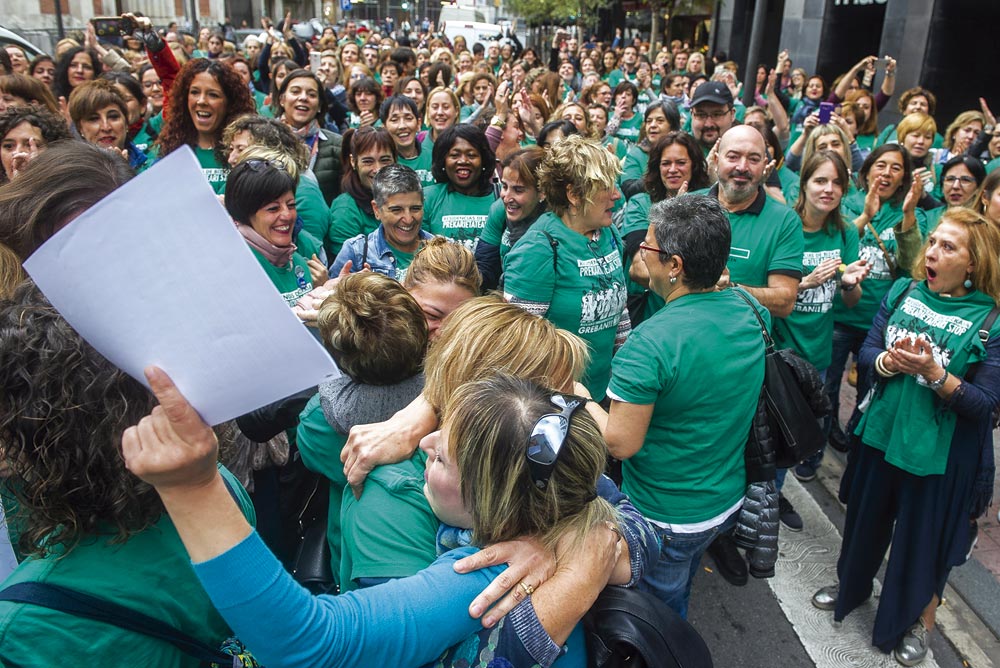
Never counted
Ainhoa Menéndez Llamosas, union delegate and ELA striker

"I'm going to tell you the conversation I had with a 21-year-old coworker. His father has a construction company and has worked as a craftsman. It's very muscular. I said: "What were you working on?" ', and it says: 'On-site. My friends laugh at me, because when I get out of this job, I feel more tired than when I was working with my old man. They don't believe me. And they tell me. ‘You’re cleaning the asses!’ I get annoyed because sometimes I have to go to the physiotherapist! '. I said: You know, keep telling all of this to your rebel friends.
Another young man is 26 years old and an athlete. He also says he pours out and goes to the physiotherapist. This work has always been done by women, without charging many times. We're spreading a story that's never been told. We have also told the disqualifications of the employers: Why do you want girls to increase their pay so much? Why do they claim so many licenses? Can't you go to the doctor with an altered day of work? Why don't your parents take your child to the doctor?
Contempt at the negotiating table
Maribel Sampedro Martínez, Trade Union Delegate and Striker of ELA

"It may have cost us more because of the kind of strike we have done and, of course, because women are not so much heeded. Strike and negotiating table. If you told a man what we were told, he would rise up and stab him. I've been at some tables and I've been looking forward to giving. I've heard about bibs. I didn't stop there. [Sampedro talks about the fact that almost all the women we interviewed for the book have told us. At the negotiating table, one of the bosses made a gesture to grab his testicles and said: “Your improvements will come from here!”]. It’s a simple memory of that example… My body is making me so impossible and so rabid! They think our wages are complementary at home. We don't go to the table to talk about our private life, you don't know if I have someone next to me or if I stick. At the table we talked about convention and we met to reach an agreement. You have to talk about person to person, not man or woman. But they talk to the woman, a woman who has a salary supplement. The gesture of that man put me in a very bad mood.
Annoying Worker
Marina Costa Bonome, ELA trade union delegate and striker

"A lot of women started working late and we've paid little. Now we are precarious and then we will be. We will have to live from our children's handouts. I'm 59 years old, I've made strikes that are and are not, and I've worked eighteen years. Will I have about 400 euros when I retire?
Apart from my retirement, if I were now unemployed I would not find a job. I have been one of the most well-known faces of the strike. I am familiar with all the employers, the Member also. You know, I won't stay quiet or quiet. My children don't want them to relate to me, for example, on social media, they're afraid. The problem of finding work does not matter to me too much, I repeat, above all my dignity, the dignity of women and workers. No one has forced me to act in this way. We have to change the model of society and we cannot be looking at what is going on, we have to do our bit. In the residence I will continue with our demands, in the network with other women from Spain, I participate in the demonstrations of the retirees… I solved my problem and it is, that is not worth it".
Proud of himself
Marisol Rueda Espinha, fired after the strike

"I woke up, I'm stronger after the strike, and I haven't been able to do anything. I thought I couldn't get to where I've come. Going to our residence to group stickers and I would say to them half joke: I don't want to put stickers on the crystals, if the witch [the director] comes out, what? The people from the residence in the Rekalde neighborhood came to help us. Aupa Marisol, you are capable! '. I was afraid, and I was like, "What do I do?" I've put my job at stake! '. I said it to myself, I didn't tell anyone. I started to lose my fear. How many people we met, how many people I started to meet… I started doing every day on strike and taking part in the acts. I have become a person without fear, proud of what he has done and would do again if there were another strike. I've grown up, I don't know how to say it, before I was like a shit dog. I went to the facts and I was proud, I ended up saying, "Why now am I going home?" The strike has been great for me, it has opened my mind for many things, I've met a lot of people, I've met people with a lot of problems, we've helped, it's been amazing."
Respect for trade union representation
Aitziber Tolosa Contreras, trade union representative and striker
.jpg)
"As a union delegate, you learn a lot. At first you don't even know what a covenant is. As you learn, you go to the principal and say, "Beware! I also know what I am talking about. For example, in the case of days off, at another time the manager would have called him over the phone and would have told him: 'Today at 23:00 come to work' and you'll leave. Now you'll tell him: "I'm not going, it's my day off. My mother was sick and I had to go to the hospital and they would tell you: - You can't take so many days off! '. They try to take away as many days as possible. It is up to you to say: "How not?" The agreement so provides.' Another example: always go to the doctor on free days. But it doesn't always give you the shift on days off. As a union delegate, you learn a lot and they respect you more. For example, I did an in vitro fertilization process to have a child and needed many days. He said to them in the direction, "In those days I don't come," and they said, "OK." He was already a trade union delegate, they do not want problems with us.
Fighting housewives
Kontxi Rodriguez Palacios, trade union representative and striker

"I've lived this strike very hard. A very close link has been built in the group, especially among women, because it is a feminized sector, but we have also had men by our side. I live feminism, I have a gender perspective, but women of one age, who have had other experiences, played differently: they had in their heads that to go to the demonstration they had to leave the food prepared at home, before going to the protest they had to leave everything ready for husband and children. They were typical housewives, working outside the house, but they were housewives. Day after day we have held demonstrations, camping, marches, gatherings… Do you know what these women have learned? Being a person, not a caregiver, not a daughter, not a mother, not a wife, but a woman. They worried about what they were going to do. I am very happy and proud of this achievement. We have gradually achieved this, the group has strengthened itself, strong ties have taken place between women.
Many women were very afraid; they would use the words dependence, submission, conformism to describe their attitudes. Such a strike requires courage and courage. The strength of the group was so great that it was enough for us to lift those who came down.
LANBIDE has launched an anti-fraud campaign in Income Guarantee Income and has created an anonymous whistleblower. Responding to the criticisms received, he said that this mailbox was merely an instrument for ordering complaints and notifications. It does not promote class... [+]









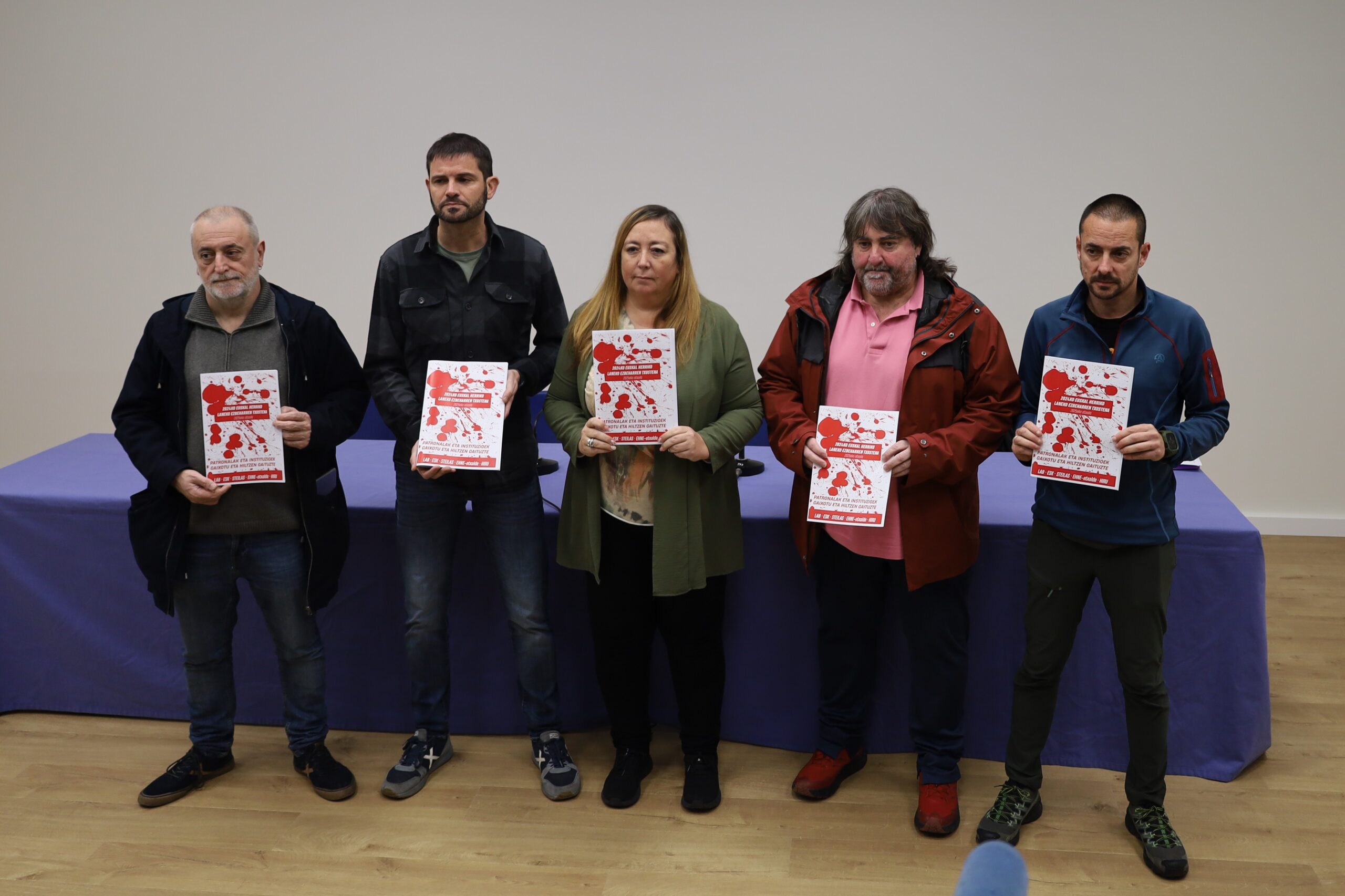
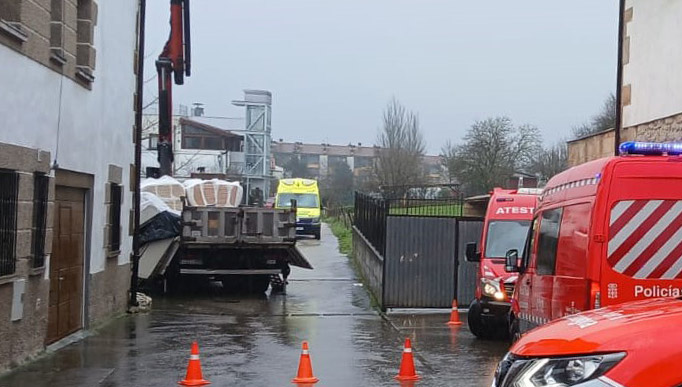




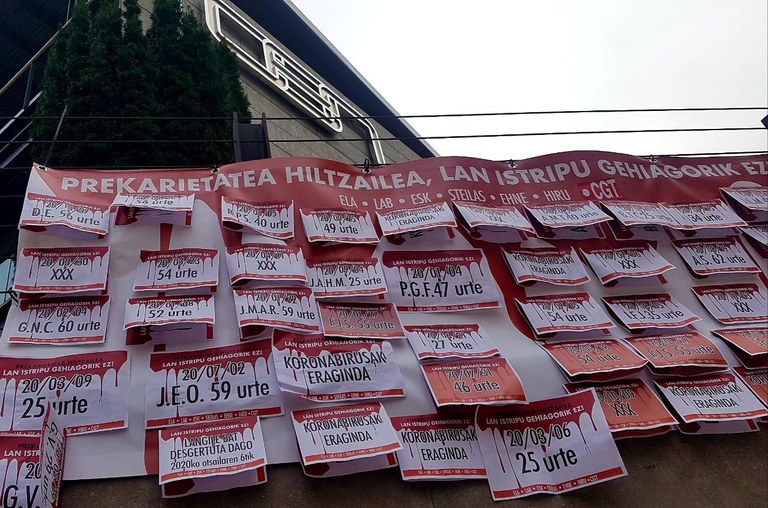
-(1).jpg)




